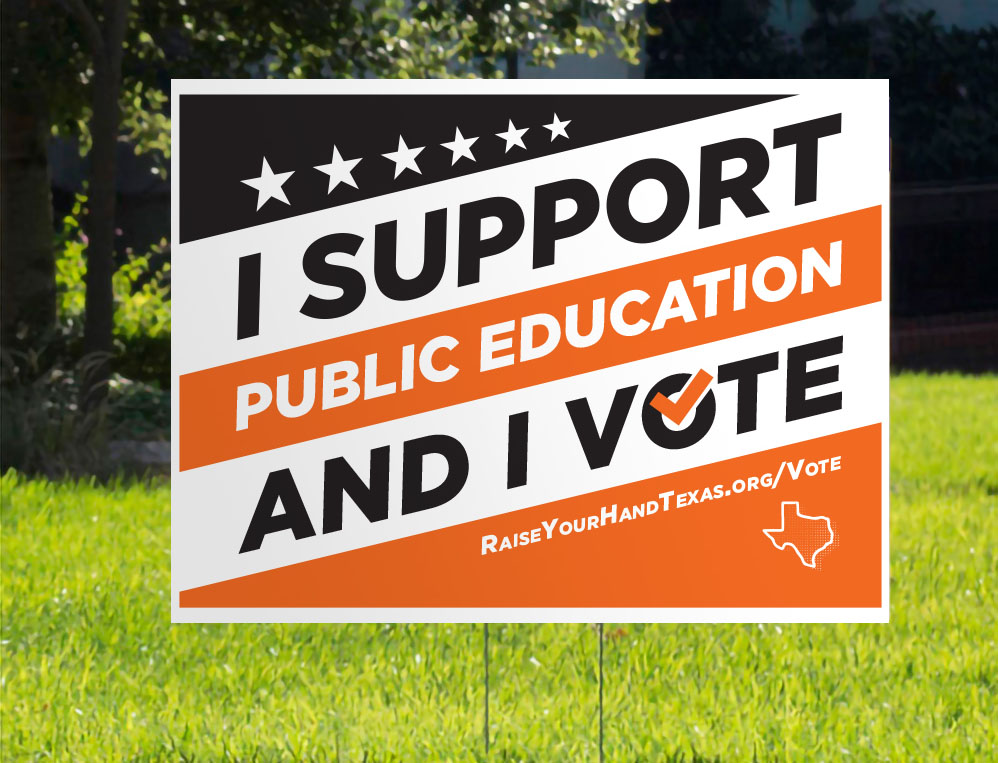Texas’ future success depends on how well we educate students today. It is crucial to elect leaders who support investing in the 5.5 million public school students who are the future of Texas.
Public schools are at the center of our democracy. They are where we learn about how our government works, and the meaning of civic duty and responsibility are taught. There is no better way for Texans to show their support for democracy than by voting for candidates who support Texas public schools.

WHAT’S YOUR ROLE?
There are several ways you can do to help create a culture of voting. These include encouraging staff to sign up for voter updates, election text reminders, contact your Regional Advocacy Director, and more.
Superintendents
- Make sure all district employees (new hires and continuing employees) are registered to vote.
- Share important voter registration, early voting, and election day information with all district employees.
- Host candidate forums – invite all candidates, ask questions related to public education, and remain non-partisan.
- Facilitate voting for employees – allow them to vote at lunch or during planning periods.
- Aim for 100% turnout of all district employees – encourage competitions between campuses for highest voter turnout.
- Hold a “Why Vote?” video contest for students and post the winning videos on the district website.
Principals
- Register eligible students and staff to vote twice each year (and keep voter registration cards in the office all year round).
- Aim for 100% campus voter turnout among staff and eligible students – hold competitions between grades, blue jeans days for “I Voted” stickers, etc.
- Post election dates, hours, and locations on marquees, and include this information in campus newsletters to parents.
- Hold mock elections with students to help them understand becoming an engaged and educated voter.
- Host demonstrations of electronic voting machines for new voters.
- Organize an art contest for students to design voting posters and post entries around the school.
Teachers
- Be a model of civic engagement by registering to vote, learning about candidates, and voting.
- Attend candidate forums and listen to how candidates answer questions about issues you care about.
- Make plans to go to the polls together during early voting.
- Have a voting party for friends and make voting fun.
- Discuss with students the importance of elections and the voting process. Remind them that voting is a civic responsibility.
- Wear your “I Voted” sticker proudly on early voting days and on election day.
Parents/Community Members
- Register to vote – make sure your registration is up to date and active.
- Vote in every election and bring your children to see you exercise your civic duty.
- Visit your elected officials in your district office and talk to them about what is important to you and your family. (Bring your children)
- Become a voter registrar in your county so you can help register others at school and neighborhood events.
- Instill community pride and invite elected officials, local businesses, and non-profit organizations to your school events.
- Attend candidate forums and listen to how candidates answer questions about issues you care about.
Board Members
- Commit to supporting a district-wide culture of civic participation. (sample board resolution)
- Aim for 100 percent voter registration and turnout of eligible employees and students.
- Support your superintendent, administrators, and educators in their efforts to make this vision a reality.
- Coordinate with city and county officials to jointly encourage voting.
- Make district-wide voter registration and turnout a metric in your district plans.
- Talk about the importance of voting at every high school graduation and have voter registrars on-site to register eligible students.
EASY STEPS TO MODEL CIVIC ENGAGEMENT

RESEARCH
See who is running where you live. Learn more about the candidates with information collected by BallotReady.

VOTE
COMMIT TO VOTING
Saturday, May 3, 2025
| January 1 | First day to apply for a ballot by mail |
| April 3 | Last day to register to vote |
| April 22 | Early Voting Starts |
| April 22 | Last day to apply for ballot by mail |
| April 29 | Last day of early voting |
| May 3 - 7 a.m. - 7 p.m. | Election Day |
Tuesday, November 4, 2025
| October 6 | Last day to register to vote |
| October 20 | Early Voting Starts |
| October 24 | Last day to apply for ballot by mail |
| October 31 | Last day of early voting |
| November 4 | 7 a.m. – 7 p.m. — Election Day |
Mail-in Voting Information:
Here are some helpful instructions for you, if you are considering voting by mail.
Click here for a vote by mail application document.


